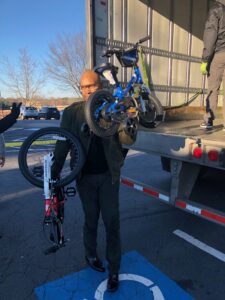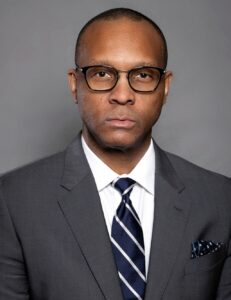By Maria Saporta
A couple of years ago, one of Georgia’s oldest nonprofit organizations – Families First – was struggling with a turnover in leadership for the past several years.
Then in September 2019, the nonprofit brought on DePriest Waddy to be its new CEO. Waddy had more than 30 years working with nonprofits and Fortune 500 companies, most recently serving as executive director of the Jefferson County Committee for Economic Opportunity in Birmingham.
Today, Families First is holding steady and growing – despite having to face the challenges of delivering social services during a pandemic.
On Wednesday, June 9, it will hold a free virtual event – Unity for a Difference – at 9 a.m. It will honor several of Atlanta’s top leaders – spotlighting their work in diversity, equity and inclusion. The honorees include:
- Carol B. Tomé, CEO of UPS, who will receive the Social Equity Award;
- Venessa Harrison, president of AT&T Georgia, who will receive the Making a Difference Community Service Award;
- Pat Upshaw-Monteith, president and CEO of Leadership Atlanta, who will receive the Community Impact Award; and
- Jim Curry, Families First’s board chair emeritus, and Ann Curry, founder Coxe Curry & Associates, who will both receive the Montag Family Volunteerism Award.
The co-chairs of the Unity for a Difference event include: Dan Gordon, Atlanta headquarters lead at Jabian Consulting; Tori Forbes-Roberts, a senior vice president with Delta Air Lines; and Shan Cooper, executive director of the Atlanta Committee for Progress, who is serving as honorary chair.
And at the June 4 Transform Westside Summit of the Westside Future Fund, Waddy and his team presented the progress the nonprofit has made in the last 20 months.
““The community was waiting for leadership that could lead Families First into its next life,” Waddy said in a recent interview. “We’ve been around 130 years. They felt that our brand had become a little bit stale and a little bit dormant.”
When he came on board, Waddy didn’t think the organization could wait a year to develop a strategic plan. He believed it needed to take “some calculated risks” and “roll up our sleeves” to design the strategic plan immediately.
It engaged community leaders, its board and staff for a comprehensive view of what was needed and how Families First could become more relevant.
Then when COVID-19 changed the equation, Families First adjusted its plan to become relevant during a pandemic.
“In essence, we became busier than ever,” Waddy said. “Our most vulnerable population was in our Second Chance Home.” (It’s a group home, which serves adolescent females and teen mothers). “They’ve either been sexually abused or trafficked, and we’ve been working with them to get them back on their feet.”
The 365 day, 24-hour home normally rotates its 10-member staff. But with COVID, Families First created a bubble, and staff members agreed to stay there around the clock.
“We were really fortunate to be able to get through a pandemic with minimal casualties,” said Waddy, who added that the “sweet spot” in his career has been to accelerate children and families either through mentoring or workforce development.”
Families First serves about 16,000 families a year thought foster care services, adoption and sounseling, but Waddy felt it could do more.
“We were always focused on making sure the kids were taken care of, but no one was really working on strengthening the muscles that the parents need in order to raise their kids better,” said Waddy, adding Families First would have to work with people to change negative behavior.
The nonprofit designed a new model for “resilient families.” The vision is to work with both the parent and the child to offer services like counseling, parenting skills and maternal health support while working with other nonprofit partners to offer housing, education, nutritious food and workforce development.
Families First developed the “Navigator” care model to assess the needs of families and provide intensive early intervention services.
So far, the strategy appears to be working.

DePriest Waddy unloads bicycles donated by Publix to foster care programs across the Southeast (Special: Families First)
“Financially, we’re very strong,” said Waddy, who was able to leverage existing relationships and bring on new donors around the “Resilient Families” model. “It was it was a game changer for us.”
Now Waddy believes collaborating with other nonprofits will be key in raising funds and to make sure Families First will be around for another 130 years.
If parents are demonstrating positive behaviors, then “that’s another sack of bricks on a child’s back” – making it more difficult to stay in school, do homework and get that great job.
“But if they see mom and dad doing things differently – going to their mental health sessions, looking for a better job, getting that better apartment or a better house, overcoming obstacles such as getting a car fixed, working with a nonprofit, and understanding that you could go to a family’s first or goodwill, or to request – then that is going to make the mentoring and coaching experience even stronger.”
Waddy, 58, is pleased with the progress Families First has enjoyed since he came on board.
“I’ve always been attracted to organizations that needed some type of heavy lifting,” Waddy said. “I take this leadership role extremely seriously. I could definitely see myself being here long term, Atlanta is a community where I’ve got so many heroes that I’ve been fortunate enough to know. So as long as I can walk and am viable, I’m going to be giving to this community.”
"first" - Google News
June 08, 2021 at 05:21AM
https://ift.tt/3v0wehb
Families First on the rebound – focusing on making families more resilient - SaportaReport
"first" - Google News
https://ift.tt/2QqCv4E
https://ift.tt/3bWWEYd
Bagikan Berita Ini















0 Response to "Families First on the rebound – focusing on making families more resilient - SaportaReport"
Post a Comment